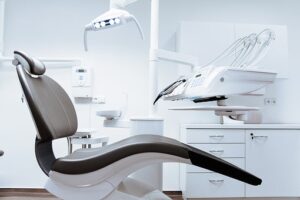It’s been five, ten, even fifteen years since you’ve scheduled a dental appointment. Thoughts of sitting in the chair, the sound of the drill, the smell, the childhood memories of having to line up at school dental to be seen by a therapist. The dread of… what they might say… the pain… the loss of control… their rough, impatient hands… All still engraved in your memory.
You know that you’re long overdue. You know that your teeth will be beyond repair if you don’t pick up the phone now, but that still doesn’t prompt you to spring into action. The thought of having hours upon hours of painful, costly treatment to repair them, doesn’t make it any easier to make that call.
Until, well, you just can’t bear it anymore. The dull, nagging ache that you’ve been putting up with for the last two months, has turned vengeful. You haven’t been able to shut your eyes at night. The pain is piercing – it’s worse than anything you have ever experienced. How is it even possible to survive this pain? Panadol doesn’t help. Not even Nurofen. Now you have no choice. For a split second, you are grateful that dentists exist, but how will you manage? You break out in cold sweats, you clench your clammy hands as you pick up the phone and tell us that you can’t wait any longer.
I wish this story was from a horror movie. I wish I could tell you that it’s a dream that will be over soon. As a dentist, as the most dreaded and feared, I hear this story every day. That’s why it rolls off my tongue so easily.
You are not alone
In my decades of experience as a dentist, I’ve met patients like you whose fear of the dentist range from mild nervousness to a phobia so deep and debilitating that despite all reason the patient can’t even sit in the dental chair for a routine screening. Even though you might feel that your dental phobia 
fear of suffocating or drowning especially if you have a strong gag reflex, the fear of cost or judgement. Whatever the trigger is, the physiological response is that of fight or flight. Hyperventilation, racing heart, sweating, agitation, clammy palms and of course the desire of run away from me. Generally, I am not a scary person until I put my clinical gown on, and then voila! I turn into Freddy Krueger.
Smell
People often remember the smell of a dental practice, so distinctive it’s still fresh in their minds. How could anyone forget Zinc Oxide Eugenol that now belongs in a dental museum. It’s a part of history. A missed item in dental armamentarium. Long forgotten by young dentists, yet the memory of it lives in our minds. ZOE (Zinc Oxide Eugenol) and we lovingly call it, is a material that was widely used in dentistry for temporary fillings and as a cement. Even though it’s still around and is used from time to time as a material in temporary fillings, we have much better and stronger fillings so ZOE rarely comes out of the cupboard. These days, most dental practices focus on giving you a spa experience, which means the aroma is more likely to be reminiscent of essential oils than of ZOE.
That dreaded sound of a drill
ZZZZZZ…. ZZZZZZ… that nightmarish sound. The extraordinary pitch of the high speed handpiece and the rattle of the slow speed drill. You tense up because you know the pain is coming… coming… coming… when? It never comes. That’s the reality of modern dentistry. We have incredible anaesthetics these day. As one of my dear patients says, “Numb me up from the waist up, will you?” Today we have local anaesthetics that are so profound, patients report being numb up to 8 hours after surgery. So not only is the procedure painless but so is the recovery. As far as the sound is concerned, bring earphones. Listen to your favourite tunes.
Painless dentistry is possible
This is probably the hardest to believe, but it’s true. With a dentist that is patient, you should feel little-to-no pain. I always assure my patients that if they put their hand up at any point in my procedure, I will stop. I will not persevere unless the tooth is completely numb, and if it’s not, I will stop what I’m doing and re-numb the area.
There is one caveat, you need to help me. If you think you might have a problem with a tooth, please come to see me as soon as possible. The earlier we catch it, the easier it is to numb it up, the more comfortable the experience is for you. Do we have a deal? It’s only those pesky, infected teeth that can be harder to numb. If a tooth gets infected, the acidic nature of infection gobbles up the anaesthetic so fast that we have to stop regularly to re-numb it. An experienced dentist will have a few tricks and techniques to numb a tooth if it doesn’t behave as expected.
Injections shouldn’t hurt
Needles today are hardly wider than a strand of hair! When patients experience pain during an injection, it’s actually because the dentist is putting in the liquid too quickly. With patience and attention to detail, and a slow, steady hand, you should feel very little discomfort or no pain at all during the injection. Don’t believe it? You’ve gotta try it! No fancy technology in the world will compensate for human impatience. Injections just don’t hurt if they are done slowly.
Rest easy, you have options
Over the years, I’ve seen countless patients who have put off going to the dentist because they are terrified that all of their teeth will need to be extracted. Breathe easy. The days of teeth extraction are quickly becoming a thing of the past.
Thirty years ago, it wasn’t uncommon for extraction to be the most cost-effective, easiest “routine maintenance” in dentistry. Today, it’s an absolute last resort. Some patients don’t realise their teeth can be saved. Dental technology has come a long way, and fillings, crowns, and implants are stronger, natural-looking, and are becoming more cost-effective. Dentists are shying away from extracting teeth and saving patients from a lifetime of uncomfortable, loose dentures. So let’s discuss your options.
Let’s start a conversation
The longer you’ve spent avoiding the dentist, the greater the chance that making an appointment has grown so great it feels like
Ring the dentist, don’t book online.
Although many dentists now offer online bookings for convenience, sometimes chatting to a friendly receptionist will begin to put your fears at ease as you build rapport with the clinic. Somebody who works with the dentist every day is likely to know a great deal about them. A front office person sees patients at the practice day in and day out. They will tell you if you have called the right practice and if the dentist is gentle and understanding.
Start by booking a consultation or general exam, not a procedure. Meet the dentist, get to know them before committing. Above all, you have to be comfortable with them. They need to put your at ease. Ask questions. Talk about your fears. It helps your dentist attend to you on a personal level, and when you do schedule that routine clean, filling, or crown, you’ll feel more at ease knowing that you’re coming to someone you can trust and has your best interests in mind.
How to choose a dentist who can help you with your dental phobia?
This might be hit or miss until you find someone you feel comfortable with. Ask your family, friends and colleagues for a recommendation. It’s likely that if they’ve had a good experience you will too. You can read reviews online as a guide but be a little careful with these. There are great dentists out there who just don’t have a big online presence. They might not be good at marketing but they can be fantastic at what they do.
The first consultation is crucial. Observe how attentively you are treated by the dentist and the team. Do they have enough time to listen to your concerns? Do you feel heard and understood? The team should be able to put you at ease. After all, they see anxious patients day in and day out. Ask questions, get a feel for who they are and what they offer. The dentist can have many letters after his or her name, but remember dealing with phobic people is not a specialty – it’s a passion! If the dentist is upfront, honest and forthcoming, it’s likely that you are in good hands.
Find a dentist who puts you in control
During a consultation and exam, a great dentist will present you with all of your options. They may offer advice and wisdom based on their experience, but at the end of the day, they will always leave the decision to you. They will provide all-inclusive treatment plans with accurate prices, and give you every available option. It will never be about what’s easiest or most profitable for them, but rather, what is best for you and your lifestyle.
What if you feel too anxious to even try?
I’ll be honest: 99.9% of the time a patient who wants sleep dentistry sits in my chair for the first time, by the end of the initial consultation, they feel calm enough to opt out of it. Trust between a doctor and a patient can ease even the most troubled minds. When you find a dentist who has your best interests at heart, you’ll know it.
However, if you still want to talk about sedation options, sometimes light oral sedation is exactly what the doctor prescribed. It could be an oral sedative pill such as Valium, Xanax, Nitrous Oxide (laughing gas), or the “green whistle”. One way or another these are all forms of light sedation which can help you alleviate some of your anxiety. However, you won’t be fully asleep. You will be aware of what’s happening around you. Many of my patients describe the sensation like, “I was awake and aware but it’s as if it didn’t bother me”.
Light sedation is a cost effective option that usually costs less than $100, and helps many of my patients. You will need to arrange someone you trust to drive you home as you will not be able to drive for the rest of the day. However if you simply can’t bear the thought of being awake, sleep dentistry may be the best option for you.
Meditation technique
Some of my anxious patients, practice meditation during treatment. It’s a skill that can be learned and developed. The mind is powerful. With the help of a qualified psychologist, you might be able to learn how to transport your mind to another place. Perhaps to a beautiful beach or a forest. Somewhere peaceful and tranquil, where the thought of a dental visit, well, is not as terrifying.
Sleep dentistry
Lovingly referred to as “Sleep dentistry” or “Twilight sedation”, is what I call magic. A qualified anaesthetist or a sedationist will administer IV sedation or general anaesthetic. You go to sleep, we do all the work, and wake you up when it’s all done. How much easier can it be? You will have a very enjoyable day. Most of the time, we can combine many treatments into just one session. However, as is the case with root canal treatment, crowns and implants, several sessions might be required. To be kind on your hip pocket, I usually advise to do follow up sessions under oral sedation, and most patients manage just fine this way.
What is the cost for sleep dentistry?
In addition to the fee for your dental treatment, an anaesthetist will charge for their service. Typically they charge anywhere from $700 – $850 per hour, so the total fee will be determined by the duration of the procedure.
Medicare Rebates on Sleep Dentistry
The good news is that if general anaesthetic is administered by a qualified medical anaesthetist, you will get a Medicare rebate for twilight dentistry. This can range anywhere from 15 – 80% of the total fee. A dentist who works closely with an anaesthetist, will
help you estimate how much you are likely to be out of pocket. On average, for longer procedures, twilight dentistry will set you back $2,500 – $3,000.
Practice Makes Perfect
If there’s one tip I have for my nervous patients, it’s to simply show up to your first appointment. The first step is the hardest. Routine check-ups mean less frequent, costly, and invasive procedures. Dentistry may be a chore, but once you get over that initial fear, routine cleans are a breeze. The healthier your teeth are, the less often you have to come and see us! Dentistry may be the only profession where we hope to see our customers spend less money and time with us every appointment! Prevention is the end goal, so we strive to get your smile back to picture-perfect health.
Conclusion
Dental phobias are complex and take years to form and there is no miracle solution to them. No one can undo them overnight – not even the greatest dentist! I don’t hold magic in my hands but I do understand. If you are not willing to make that first step, I cannot help you. Dental phobias are common and costly—fear of the dentist often leads to dental health neglect, which is a vicious cycle, because neglect means more time spent with the dentist when painful or dangerous complications arise.
I’ve treated thousands of patients with a dental phobia. It can be challenging for both of us. But when I look at these people after we’ve completed their treatment, I am reminded of why I wake up in the morning to face another challenging day. I am reminded of every trial and tribulation…. Of every triumph that led to where these people are today. Every time I see them come back for their 6 monthly check ups beaming at me, I am grateful that they have put their trust in me, and we have achieved little miracles together.
So, my dear patient, please make the phone call today. We understand, we want to help, and we want to see you smiling again. Truly.
Warm regards,
Dr Helen Voronina




